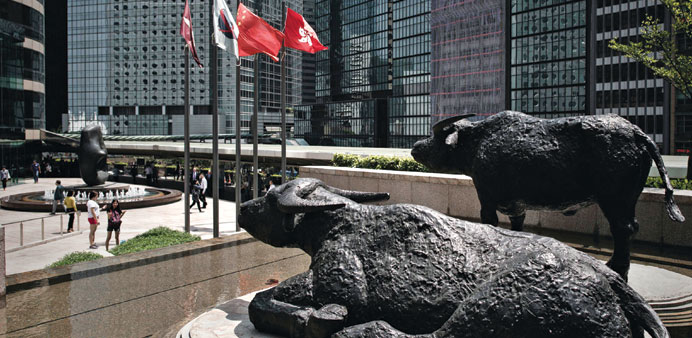Two bull statues displayed outside the Hong Kong Stock Exchange. Hong Kong initial public offerings are the world’s worst performers this year, burning investors from BlackRock to billionaire Cheng Yu-tung as the city’s stock market gets battered by China’s $5tn sell-off.
Bloomberg
Hong Kong
Hong Kong initial public offerings are the world’s worst performers this year, burning investors from BlackRock to billionaire Cheng Yu-tung as the city’s stock market gets battered by China’s $5tn sell-off.
New listings in Hong Kong this year have dropped an average 28% from their offer prices when weighted by deal value, the most among global bourses tracked by Bloomberg. Companies accounting for 98% of IPO fundraising in the city this year – or $19.7bn of deals – are trading below their offer prices. Every listing of at least $100mn is under water.
In a market where losses in the benchmark index reached the most extreme levels since the 1987 crash at one point this week, Hong Kong’s IPOs have been hit even harder. The worsening sentiment could make fundraising more difficult for Chinese state firms planning to sell shares later this year, including investment bank China International Capital Corp and bad-loan manager China Huarong Asset Management Co.
“Nobody is interested in buying anything now,” said Francis Lun, the chief executive officer at Geo Securities Ltd in Hong Kong. “There will be fewer companies coming to list to Hong Kong.”
The selloff is putting a damper on the best start to a year for Hong Kong’s IPO fundraising in at least a decade. First-time share sales in the city have totalled $20bn so far in 2015, up from $16.3bn in the same period last year. That compares with $23.8bn in mainland China and $29.8bn in the US.
Most of Hong Kong’s largest deals this year were Chinese companies, which have come under pressure as growth in the world’s second-largest economy slows.
China Merchants Securities Co was the busiest arranger of IPOs in the city with an 8% market share, according to data compiled by Bloomberg. Goldman Sachs Group ranked second with 7.7%, followed by Morgan Stanley and UBS Group.
The 10 biggest offerings in the city this year have fallen an average 29% since listing through Wednesday, compared with an average 18% drop in the Hang Seng Index since those stocks began trading. The benchmark gauge rose 3.6% Thursday in Hong Kong.
Huatai Securities Co’s $5bn first-time share sale in May priced at the top end of a marketed range, after attracting investors including Och-Ziff Capital Management Group and Chinese technology mogul Ma Huateng.
The Chinese brokerage declined 48% from its offer price through Wednesday. It was trading Thursday at 1.06 times estimated 2015 book value, versus 1.30 for larger rival Citic Securities Co.
Chinese conglomerate Legend Holdings Corp was down 35% Wednesday since its June debut, compared with a 21% retreat in the benchmark gauge. The $8.5bn company sold nearly half its IPO shares to cornerstone investors required to keep their holdings until December, including billionaire Cheng, who controls the world’s largest jeweller, and property tycoon Walter Kwok.
Legend shares rose 11% Thursday to value the company at 1.19 times this year’s estimated book value, compared with 0.75 for Citic, another Chinese conglomerate with investments in financial services, steel and energy.
Biopharmaceutical producer 3SBio lost 18% through Wednesday since its $818mn IPO in June, creating paper losses for cornerstone investors including BlackRock, the world’s largest money manager, and GIC, Singapore’s sovereign wealth fund.
The buyers haven’t realised their losses yet, and the holdings in this year’s IPOs represent a small portion of their overall portfolios.
Stock prices could still rise before the so-called lock-up period expires. GIC and Och-Ziff declined to comment, while a representative for BlackRock didn’t immediately respond to a request for comment.
Kwok said through his spokeswoman that Legend is one of China’s top state enterprises and its “highly successful track record speaks for itself.” A spokeswoman for a company controlled by Ma said she couldn’t immediately comment, while an official at Cheng’s family investment company didn’t answer calls to his office.
“The overall market is not performing well, and that’s affecting the atmosphere of all investments, including IPOs,” said Sam Chi Yung, a strategist at Delta Asia Securities Ltd “Those investors who subscribed are suffering.”

